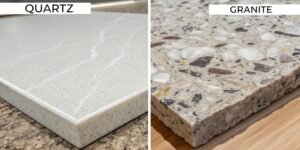Improper handling and maintenance of quartz stone slabs can cause costly damage, safety hazards, and project delays in bulk operations.
Provide structured, hands-on training covering safe handling, proper storage, correct cleaning, defect identification, and ongoing compliance to ensure slab integrity and staff safety.

In this guide, I’ll share the key training steps every procurement and operations manager should follow. These steps reflect industry best practices and ensure your team treats quartz slabs with the highest standards, avoiding avoidable damage while maximizing lifespan.
How do you train staff on safe slab handling?
Improper lifting or moving can result in cracked slabs or serious injuries.
Train staff to use the right lifting equipment, follow safe load limits, and always work in teams when handling large slabs.

Safe handling is essential because quartz slabs, though strong, can break under stress if mishandled. Industry best practice requires the use of A-frame carriers, clamps designed for stone, and forklifts or cranes with appropriate lifting attachments. Training should also emphasize proper body mechanics—never attempting to lift slabs manually beyond safe weight limits—and always having at least two trained handlers when moving slabs. Skipping this step risks slab breakage, employee injury, and costly downtime. Success can be measured by zero injury incidents and zero breakage events during handling over a defined period. At Opaly, we not only require all warehouse staff to pass handling certification tests but also provide refresher training quarterly, ensuring each team member consistently meets or exceeds safe handling protocols.
| Standard/Practice | Meaning | Example Value |
|---|---|---|
| A-frame storage | Secure upright slab support | Steel frame with padding |
| Max lift weight/person | Safe manual lifting limit | 25 kg |
| Equipment requirement | Approved lifting/clamping tools | Stone clamp, boom lift |
How do you train staff on proper slab storage?
Poor storage conditions can lead to slab warping, staining, or structural damage.
Teach staff to store slabs vertically on padded A-frames in a clean, dry, and stable environment.
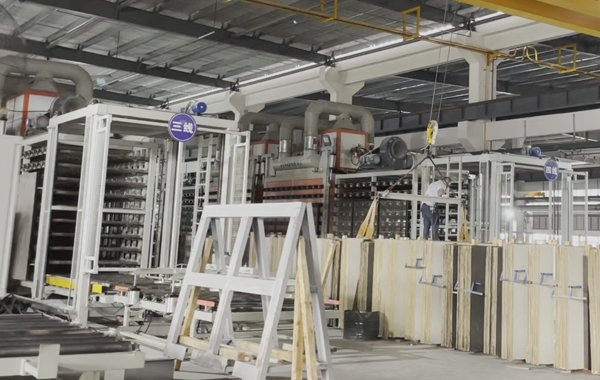
Proper storage matters because quartz slabs are heavy, rigid, and sensitive to certain environmental factors. Best practice is to keep slabs upright at a slight angle against padded A-frames to prevent tipping. They should be secured with straps or clamps to avoid shifting, and never stacked flat for long periods, which can cause stress cracks. Storage areas must be dry, well-ventilated, and free from abrasive debris that could scratch surfaces. Pallets and A-frames should rest on even ground to prevent uneven stress distribution. Ignoring these standards increases the risk of costly slab damage and makes handling more dangerous. Success indicators include no visible warping, chipping, or staining during storage inspections. At Opaly, we maintain climate-controlled storage facilities and implement weekly slab condition checks, ensuring every stored piece remains in perfect condition until shipment.
| Standard/Practice | Meaning | Example Value |
|---|---|---|
| Storage angle | Optimal slab tilt to prevent tipping | 5–7 degrees |
| Padding material | Protects slab edges and surfaces | Rubber or foam lining |
| Environmental control | Keeps slabs safe from humidity and dust | 40–50% RH, filtered air |
How do you train staff on cleaning and maintenance procedures?
Incorrect cleaning methods can dull finishes or cause surface damage.
Instruct staff to use pH-neutral cleaners, soft cloths, and avoid abrasive pads or harsh chemicals.
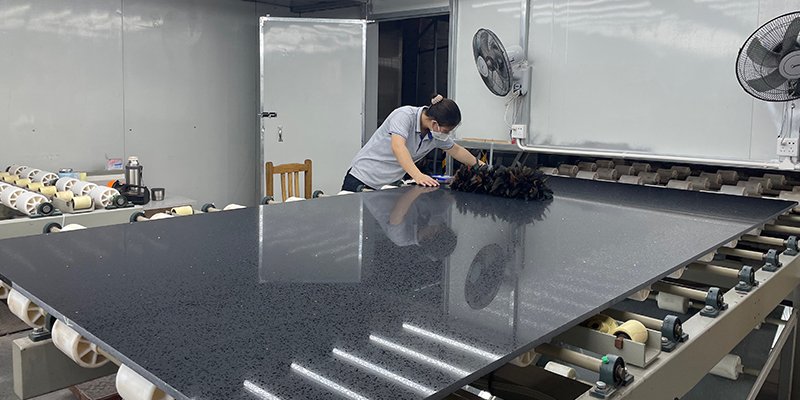
Maintenance training matters because quartz, while highly resistant to stains, still requires the right cleaning approach to maintain its appearance. Industry best practice is to wipe slabs daily with a microfiber cloth and mild pH-neutral detergent, immediately cleaning spills to prevent potential staining from colored liquids. Staff must avoid acidic or alkaline cleaners, which can damage resin binders, and never use steel wool or abrasive pads that could scratch the surface. Special attention should be given to polished finishes to maintain their reflective quality. Skipping this training leads to irreversible surface damage and customer complaints. Effectiveness can be measured by tracking the absence of visible wear patterns or discoloration after routine maintenance cycles. At Opaly, all cleaning staff undergo product-specific care training and follow our manufacturer-tested maintenance protocols, ensuring each slab retains its original beauty over its service life.
| Standard/Practice | Meaning | Example Value |
|---|---|---|
| Cleaner pH level | Prevents chemical damage to surface | 6–8 pH |
| Cleaning tool | Avoids scratches | Microfiber cloth |
| Spill response time | Prevents staining | Within 5 minutes |
How do you train staff to identify defects and damage early?
Undetected damage can cause failures after installation, leading to expensive replacements.
Train staff to inspect slabs for cracks, chips, color inconsistencies, and surface defects before dispatch.
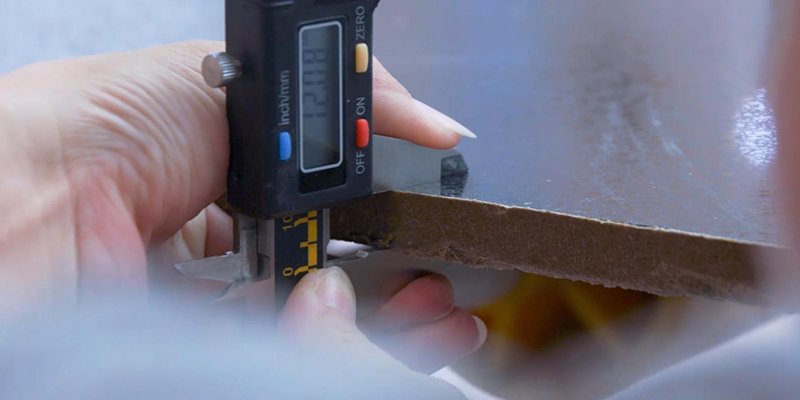
Defect identification training matters because minor chips or hairline cracks can worsen during transport or installation. Industry best practice is to perform a detailed visual inspection under adequate lighting, running hands along edges to detect irregularities, and checking for consistent color and pattern across the slab. Slabs should also be tapped lightly to detect internal fractures by listening for hollow sounds. Skipping this step can result in rejected shipments, project delays, and loss of customer trust. Success can be measured by the rate of defect-free deliveries and reduced returns. At Opaly, our QC team follows a 12-point inspection checklist for every slab, catching over 98% of defects before they leave our warehouse.
| Standard/Practice | Meaning | Example Value |
|---|---|---|
| Inspection lighting | Reveals subtle surface issues | 500 lux illumination |
| Edge check method | Detects chips or cracks | Hand-run edge sweep |
| Color consistency | Ensures uniform slab appearance | ±5% variation allowed |
How do you implement refresher and compliance training?
Skills fade without reinforcement, and safety standards may change.
Schedule quarterly refresher courses and maintain records of staff training compliance.
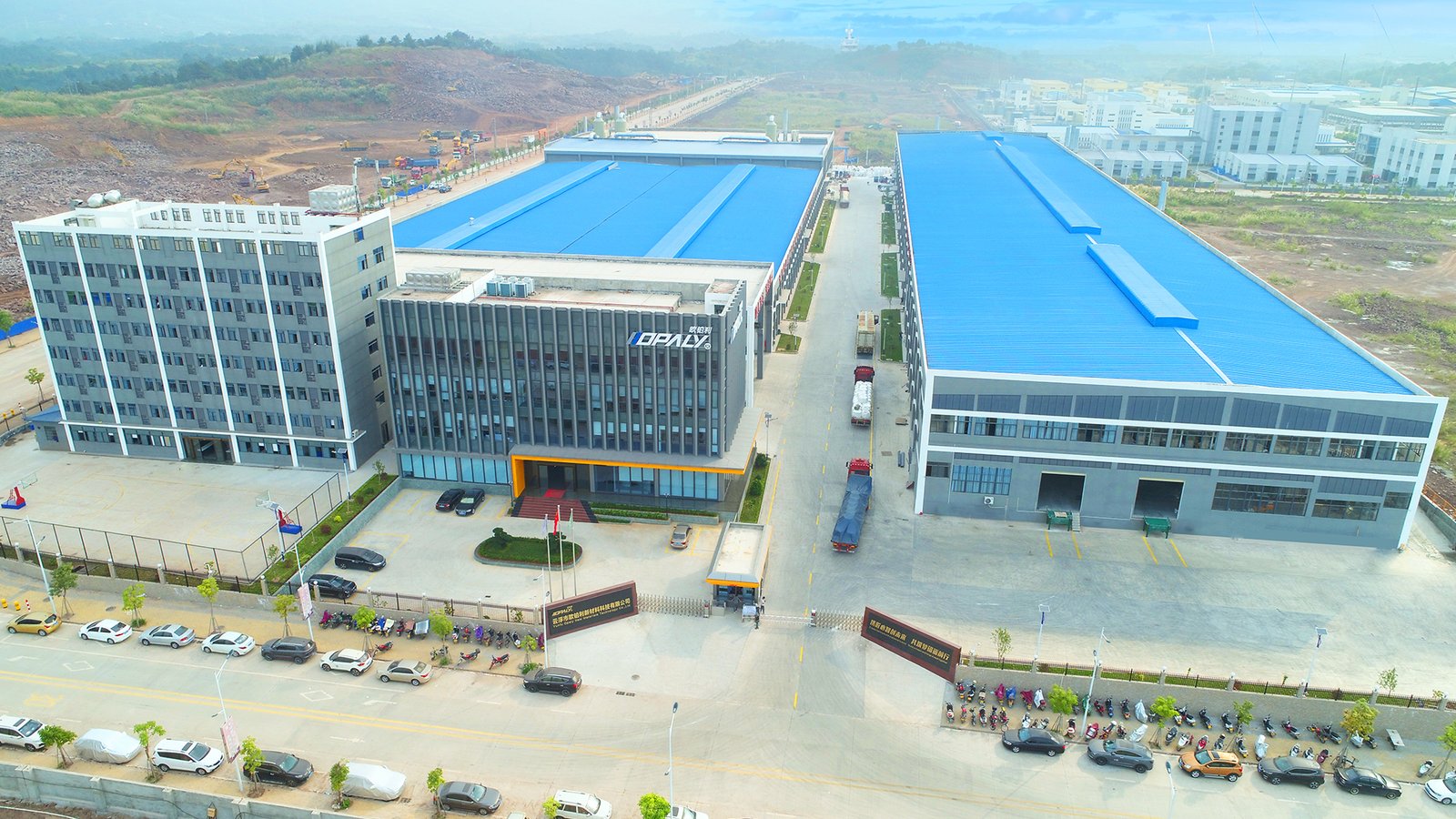
Refresher and compliance training matter because even experienced staff can develop bad habits over time. Best practice is to hold quarterly workshops revisiting core handling, storage, cleaning, and inspection techniques, while updating staff on any changes in safety regulations or product specifications. Compliance should be documented with signed training logs and certification renewals. Tracking participation ensures all team members remain aligned with the latest standards. Neglecting this step risks inconsistent practices, accidents, and preventable slab damage. Success can be measured by 100% staff compliance rates and continuous improvement in handling and maintenance KPIs. At Opaly, we use a digital training management system to schedule, track, and certify every team member’s training history, ensuring our operations always reflect current industry best practices.
| Standard/Practice | Meaning | Example Value |
|---|---|---|
| Training frequency | How often refresher courses are held | Quarterly |
| Compliance tracking | Ensures all staff are up to date | Digital log system |
| Certification renewal | Confirms skills remain current | Every 12 months |
Conclusion
Following these training steps ensures your team handles quartz slabs safely and professionally—Opaly maintains all these standards to guarantee perfect product condition for every client.




